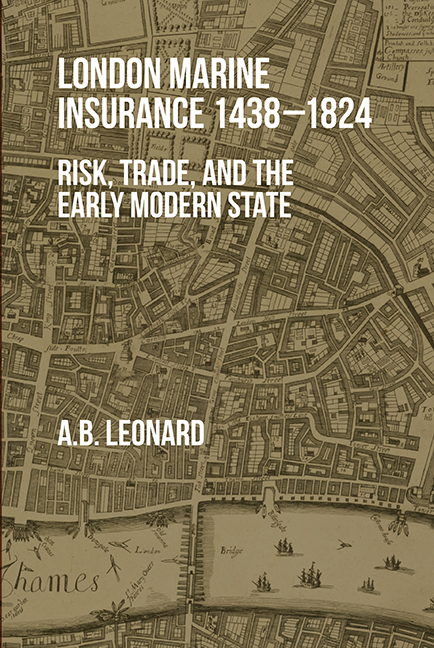Book contents
- Frontmatter
- Contents
- List of Illustrations
- Preface
- Glossary of marine insurance terms
- Introduction
- 1 The merchant-insurers’ system: London marine insurance to the 1570s
- 2 1570–1688: Buyers and the first intervention
- 3 1688–1720: The sellers’ intervention
- 4 To 1824: Lloyd’s and the common law
- 5 Conclusions
- Appendix: Some London underwriters active 1690–1717
- Bibliography
- Index
3 - 1688–1720: The sellers’ intervention
Published online by Cambridge University Press: 26 May 2022
- Frontmatter
- Contents
- List of Illustrations
- Preface
- Glossary of marine insurance terms
- Introduction
- 1 The merchant-insurers’ system: London marine insurance to the 1570s
- 2 1570–1688: Buyers and the first intervention
- 3 1688–1720: The sellers’ intervention
- 4 To 1824: Lloyd’s and the common law
- 5 Conclusions
- Appendix: Some London underwriters active 1690–1717
- Bibliography
- Index
Summary
By the end of the seventeenth century, the new institutions which had been introduced in the sixteenth to govern the insurance market had been over-turned. The Law Merchant governing practice had not been formally codified, the royalist Office of Assurance had been replaced by private brokerages, and, following the Glorious Revolution, the Court of Assurance appears to have fallen into abeyance, a victim of its tenuous jurisdiction and the merchants’ preference for arbitration. These direct interventions into the functioning of the London market did not endure, even though they had been implemented sympathetically, at the request and with the cooperation of market practitioners, the merchant-insurers themselves, in order to ease the impact of abuses of the system perpetrated by outsiders, and to strengthen the mechanisms of enforcement which could be applied to those who would not play by the rules of the game. The market returned to its self-regulatory practice under custom and the Law Merchant, and the state to the hands-off approach under which the market had originally been formed and had grown, without imposed limitations which restricted its flexibility.
England's international trading system had become part of Braudel's higher capitalist tier in the later sixteenth century, and its insurance market quickly followed. It became, in the early decades of the eighteenth century, a Braudellian ‘world-economy’. London was at the pole of an insurance world-economy which increasingly supplied international buyers within a large, multinational space. The city's network radiated out to subordinate zones where agents and merchant-buyers performed distant transactions against the underwriting capital of merchant-insurers in London. For example, during the English Civil War Dutch merchants were insuring in London, as the merchant Samuel Lambe revealed. In 1657 he wrote ‘it is the Hollanders custom… that when they send any single ship to the southward for their own accounts, oftentimes to insure them in England’.
London's market was already thriving when William III filled the vacant English throne. As war raged against France, and the risks faced by merchants and assumed by their insurers multiplied in the face of an emboldened belligerent threat, the insurance market was to prove that its institutional structures were sufficiently robust to enable it to withstand a catastrophic loss, although not without suffering significant damage.
- Type
- Chapter
- Information
- London Marine Insurance 1438-1824Risk, Trade, and the Early Modern State, pp. 109 - 160Publisher: Boydell & BrewerPrint publication year: 2022

